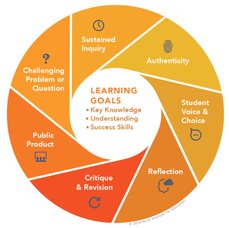PsychEd: Could you tell us a little bit about yourself and your work at PBLWorks?
I’m a former high school social studies teacher and instructional coach who joined PBLWorks in 2013. As a National Faculty for PBLWorks, my work focuses on supporting teachers with the design and facilitation of high quality Project Based Learning experiences for all of their students. PsychEd: For educators who might not be familiar with PBL, how would you define this approach and what is unique about it? I think PBLWorks does a great job at formally describing PBL, which is “a teaching method in which students gain knowledge and skills by working for an extended period of time to investigate and respond to an authentic, engaging, and complex question, problem, or challenge.” I think PBL is unique in that it honors students’ assets and strengths and it goes beyond simple memorization of knowledge for a test. To put it in terms of television shows, PBL is less like Jeopardy and more like The Amazing Race. PsychEd: What do you think is the biggest misconception about PBL? One of the biggest misconceptions about PBL is that it is light on content and not as rigorous as other approaches. PBL has a significant focus on content, but it is not exclusively about content. It involves developing collaboration, communication, critical thinking, and self-management skills. It’s about doing work that is authentic to the world. It’s about work worth doing. Content without an authentic context doesn’t feel very challenging or rigorous to me. PsychEd: For the past few years, education often had to take place online. Do you think that PBL is well suited to a fully digital or hybrid learning environment? Yes, and PBL in a fully digital or hybrid environment is just as important for students that are in face-to-face settings. All learners, regardless of setting, deserve high quality PBL experiences. For those looking to learn more about how PBL can work in remote settings, I’d direct them to PBLWorks’ resources: https://www.pblworks.org/pbl-remote-learning PsychEd: Do you think PBL has a particular role to play as more and more schools are going back to campus and resuming face-to-face learning around the world? Students are craving engagement and purpose in their learning. PBL can help meet those needs, and it plays a vital role in helping students reconnect with others. For students returning to campus, PBL is more than a mere suggestion; it’s a moral imperative. It’s the right thing to do, and it’s certainly the right time to do it. PsychEd: For those tempted to give PBL a try, could you explain the "dimmer switch" strategy? Where would you recommend that schools and teachers who are new to PBL start? The “Dimmer Switch” approach to PBL, created by my colleague and friend Kristyn Kamps, is a way to leverage the Gold Standard Elements of PBL even when you are not officially in a full PBL experience. It’s also a great way for teachers to start moving in the PBL direction, especially if they fear jumping right into the deep end of PBL. PBL doesn’t have to be a binary “lights on/light off” situation. Any lesson or unit can have some of the Gold Standard elements embedded in it to engage students while fostering competence and confidence with the teacher. In short, the elements of PBL can always “illuminate” any learning experience. To learn more about the “Dimmer Switch” approach, check out these two blog posts: PsychEd: Based on your experience, what is the main challenge when schools and teachers first introduce PBL in their classrooms? It can be tough to let go. Before I started PBL, my lessons were prescribed and led to an already determined destination. While that’s comfortable, it’s not always optimal if you’re looking for student engagement. Don’t get me wrong, PBL needs structures, systems and processes to help students be successful, but it does mean that students should have some strong voice and choice over their learning. I’m so glad I eventually overcame that challenge/fear. It helped me understand that students were way more capable to guide their learning than I initially thought. PsychEd: Thank you so much, Eric!
0 Comments
Your comment will be posted after it is approved.
Leave a Reply. |
|
Proudly powered by Weebly


